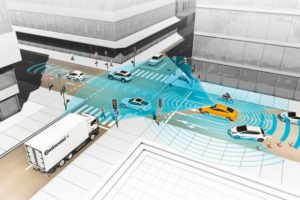Sonal Lakhotia, '20
On April 14, 2017, Ap ple was officially added to California’s DMV list for testing self-driving vehicles in the state. This is a new development that confirms Apple will be involved in the car industry soon. There were hints that Apple was interested in the autonomous car industry in December of 2016 when the company sent a letter to the federal government on the impact of automaton transportation (CNN). Though Apple has not been upfront about its intent, this development shows that Apple has found a way to reinvent the automobile as well as spread its influence into new markets to sustain growth (Business Insider). The self-driving car project is known internally as Project Titan (New York Times). The permit allowing Apple to test self-driving vehicles applies to three 2015 Lexus RX450h vehicles and six designated drivers (CIO). The permit allows for these six people to take control of the vehicle if needed in an emergency (New York Times).
ple was officially added to California’s DMV list for testing self-driving vehicles in the state. This is a new development that confirms Apple will be involved in the car industry soon. There were hints that Apple was interested in the autonomous car industry in December of 2016 when the company sent a letter to the federal government on the impact of automaton transportation (CNN). Though Apple has not been upfront about its intent, this development shows that Apple has found a way to reinvent the automobile as well as spread its influence into new markets to sustain growth (Business Insider). The self-driving car project is known internally as Project Titan (New York Times). The permit allowing Apple to test self-driving vehicles applies to three 2015 Lexus RX450h vehicles and six designated drivers (CIO). The permit allows for these six people to take control of the vehicle if needed in an emergency (New York Times).
Apple has put itself alongside Google, Uber, Tesla, and BMW, which shows that Apple is concerned that it could be left behind by its competition. Apple wants to be a part of the new developments in self-driving vehicles; however, faces stiff competition from 29 other companies that also have autonomous vehicle testing permits in California (Bloomberg Technology). Many of these companies are more familiar with the car industry and automobile hardware such as BMW and Tesla. A subsidiary of Google, called Waymo, is the leader in creating software for self-driving vehicles and is stiff competition for Apple (CNN Tech).
Though it has not been publicly stated, it is of the assumption that Apple will not be making an Apple vehicle, but instead making self-driving software to license to car-makers (CIO). This assumption seems the most likely since Apple is not as experienced in car manufacturing and Apple consumers may not be as likely to buy an Apple car. An Apple car seems to be very different from the many products that Apple currently has which are geared towards innovation, luxury, and sleekness. It would create an interesting image to see a car showroom in an Apple store; this could create branding issues. In addition, Apple has always made its products so that they are all part of the Digital Hub Strategy, and an Apple vehicle may not be able to be integrated into this strategy very effectively. Also, Apple would encounter low economies of scale to manufacture cars which could increase overhead and opportunity costs that other specialized car-manufacturers could easily out-compete Apple in. Apple has scaled back plans to build its own vehicle making it very likely that it will step into the car industry arena more on the software side and less on the hardware side (CNN Tech).
Moving forward, there will be many political and regulatory challenges to come for self-driving cars before the public can start to use them, but it is estimated that the market will be worth tens of billions of dollars in the coming years (Business Insider). Whatever step Apple takes in the car industry, it will be revolutionary and reshape transportation. As Apple CEO Tim Cook said in response to inquiries about Apple entering the car industry, “It’s going to be Christmas Eve for a while” (Business Insider). Hopefully, we will be able to see the revolutionary turn that transportation takes in the next few years.
Sources:
http://money.cnn.com/2017/04/14/technology/apple-self-driving-car/
https://www.nytimes.com/2017/04/14/technology/apple-self-driving-car-permit.html
Image Source:
http://www.pcworld.com/article/2046041/what-its-like-to-ride-in-a-self-driving-car.html
